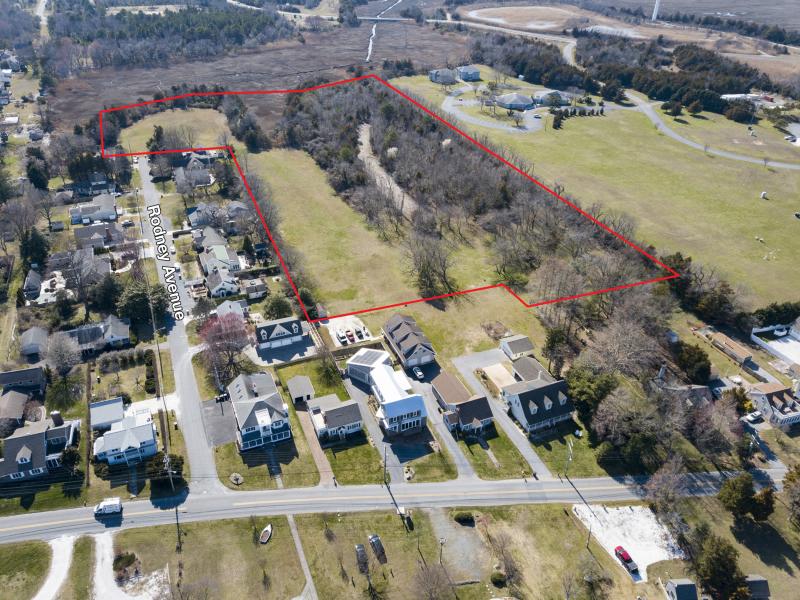Lewes council addresses Fisher’s Cove settlement
Lewes residents gathered in the Rollins Community Center May 31 to learn more about mayor and city council’s decision to settle lawsuits filed by a developer related to the denial of Fisher’s Cove.
Council voted unanimously March 2 to approve a settlement agreement which essentially paves the way for the 18-unit, single-family home subdivision on an 11.08-acre parcel at the end of Rodney Avenue off Pilottown Road.
Developer Burke and Rutecki LLC filed three lawsuits against the city following its 3-1 vote to deny preliminary approval for the project in October 2021.
In the weeks and months after the settlement agreement was announced, surprised residents aired their frustration at public meetings and in letters to the editor sent to the Cape Gazette. Recently elected Mayor Andrew Williams convened the May 31 meeting to provide residents an opportunity express their anger and to learn more about why the city decided to settle.
“I think there’s a misconception that we went in a room and came out, and that was that,” Williams said. “It was a long process. It was back and forth. There was a healthy debate amongst us as council members, but ultimately we did vote unanimously.”
Sitting at the front of the room to listen and answer questions were Williams; council members Khalil Saliba, Tim Ritzert and Carolyn Jones; City Manager Ann Marie Townshend; and attorneys Glenn Mandalas and Max Walton. City engineer Charlie O’Donnell also contributed throughout the meeting.
Because the project has not received final approval, the group was limited in what information could be provided. The developer’s representatives attended the meeting as well and addressed some of the questions.
When asked why the city couldn’t be more transparent, Mandalas said the city could still be sued, and waiving attorney-client privilege now could be a big mistake.
“That doesn’t mean the city only wavies privilege for specific questions [residents] ask; it means the city wavies privilege to every conversation we had through this entire process,” he said. “Not only would [residents] have access to that information and those conversations … so would the developers.”
He said that’s the worst position the city could be in at this point in the process.
“I know people will leave here disappointed because we aren’t able to be fully transparent,” Williams said.
Several residents wondered if the city received bad legal advice in choosing to settle the lawsuit. Barbara Curtis of Shipcarpenter Square said the city’s lawsuit against the Board of Public Works was a waste of money.
“It didn’t bring anything positive to anyone,” she said. “But I do not think a lawsuit against this development would have been wasted, even if we lost it. We would have more clarity on what can and cannot be allowed in the future.”
Walton said he could not talk specifically about advice provided to council, but he noted that three different law firms opined on the issues.
“Do we give recommendations when we see holes in the code? The answer is certainly yes,” he said. “No code is perfect – and we’re never going to make it perfect – but when we see holes or problems, as we did here, then we try to point those out to our client.”
Shipcarpenter Square resident Marty D’Erasmo said she knew lawsuits would follow the city’s decision to deny Fisher’s Cove, but she thought the city would defend them.
“I’ve read what was submitted. What I read was garbage,” she said. “It was innuendo and half-truths.”
Williams said it wasn’t one particular aspect of the lawsuits that convinced council to settle, but the cost to fight them was a factor.
“At no time were we told these were indefensible; it was that the defense would be long and expensive with no certain outcome,” he said.
Walton said the city’s insurance coverage is $1 million with a $5 million umbrella. Walton also addressed statements made in recent months about members of city council and the planning commission being protected by anti-SLAPP laws – strategic lawsuits against public participation.
“Anti-SLAPP provisions do not apply to the city and members of council; they only apply to folks who are coming in and challenging a development approval,” he said. “Anti-SLAPP provisions prevent a developer suit against folks in the public who are challenging their approvals. It does not apply to the city at all.”
As part of the settlement agreement, the city will purchase a lot in the development for $500,000. Williams said it is council’s intention to keep it as open space, but he could not speak for future councils. As a landowner, council will also be a member of the community’s homeowners association, he said.
Another benefit to the community contained in the lawsuit, he said, is the securing of a construction entrance through the University of Delaware’s property on the north side of the parcel. If successful, truck traffic would not use Rodney Avenue while the development is built. He said the developer is working to obtain an easement for the construction access now, but noted that failure to do so will not prevent the project from moving forward.
The city’s goal in negotiations, he said, was to remove parts of the development found objectionable by most public commenters, including a plan to widen Rodney Avenue.
When asked if this situation could occur again in the future, Williams said he couldn’t say for certain, but the city has taken steps to protect itself.
“We have amended [subdivision] code,” he said. “That’s one tool in our toolbox. The other is a more healthy dialogue and understanding with future developers. The other is the appetite for the city and its residents to acquire available land.”
Among items in the amended subdivision code that would have altered the Fisher’s Cove plan are a 50-foot wetland buffer, an increase in required open space and a requirement that stormwater facilities cannot be included in open space calculations.
Townshend said it’s likely Fisher’s Cove could’ve been built under the new regulations, but the lots would have been much smaller to accommodate buffers and more required open space.
In terms of acquiring land, the city is considering purchasing the 0.6-acre lot across from the Dairy Queen on Lewes Beach. A site plan to build 12 condominiums on the lot gained approval in March, but the landowner is open to selling the land to the city in lieu of building. A public hearing on the possible acquisition was held June 6. Other properties the city needs to keep an eye on include the Lewes Ice House property on New Road and the remaining piece of the Fourth Street Forest. Williams also noted the city’s recent annexation of Donovan-Smith Manufactured Home Park, which has an R-2 zoning and could be redeveloped in the future.
Nick Roth is the news editor. He has been with the Cape Gazette since 2012, previously covering town beats in Milton and Lewes. In addition to serving on the editorial board and handling page layout, Nick is responsible for the weekly Delaware History in Photographs feature and enjoys writing stories about the Cape Region’s history. Prior to the Cape Gazette, Nick worked for the Delmarva Media Group, including the Delaware Wave, Delaware Coast Press and Salisbury Daily Times. He also contributed to The News Journal. Originally from Boyertown, Pa., Nick attended Shippensburg University in central Pennsylvania, graduating in 2007 with a bachelor’s degree in journalism. He’s won several MDDC awards during his career for both writing and photography. In his free time, he enjoys golfing, going to the beach with his family and cheering for Philadelphia sports teams.














































